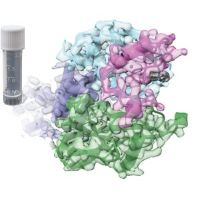Specification
| Description | Recombinant protein from the full-length sequence of Homo sapiens transforming growth factor beta receptor 1 (TGFBR1), transcript variant 1 (NM_004612). |
| Organism | Homo sapiens (Human) |
| Expression Host | Human Cells |
| Tag Info | His or DYKDDDDK. Please contact us if you need further information or require specific designed tag. |
| Purity | Greater than 90% by SDS-PAGE gel |
| Uniprot ID | P36897 |
| Entry Name | TGFR1_HUMAN |
| Gene Names | TGFBR1 ALK5 SKR4 |
| Alternative Gene Names | ALK5 SKR4 |
| Alternative Protein Names | TGF-beta receptor type-1 (TGFR-1) (EC 2.7.11.30) (Activin A receptor type II-like protein kinase of 53kD) (Activin receptor-like kinase 5) (ALK-5) (ALK5) (Serine/threonine-protein kinase receptor R4) (SKR4) (TGF-beta type I receptor) (Transforming growth factor-beta receptor type I) (TGF-beta receptor type I) (TbetaR-I) |
| Application | Antigens, Western, ELISA and other in vitro binding or in vivo functional assays, and protein-protein interaction studies; For research & development use only! |
| Buffer | Purified protein formulated in a sterile solution of PBS buffer, pH7.2, without any preservatives |
| Endotoxin | Endotoxin level is < 0.1 ng/µg of protein (<1EU /µg) |
| Length | 503 |
| Molecular Weight(Da) | 55960 |
| Protein Sequence | (The sequence of expressed protein may have some variation from the sequence shown below. Please contact us for the exact sequence.) MEAAVAAPRPRLLLLVLAAAAAAAAALLPGATALQCFCHLCTKDNFTCVTDGLCFVSVTETTDKVIHNSMCIAEIDLIPRDRPFVCAPSSKTGSVTTTYCCNQDHCNKIELPTTVKSSPGLGPVELAAVIAGPVCFVCISLMLMVYICHNRTVIHHRVPNEEDPSLDRPFISEGTTLKDLIYDMTTSGSGSGLPLLVQRTIARTIVLQESIGKGRFGEVWRGKWRGEEVAVKIFSSREERSWFREAEIYQTVMLRHENILGFIAADNKDNGTWTQLWLVSDYHEHGSLFDYLNRYTVTVEGMIKLALSTASGLAHLHMEIVGTQGKPAIAHRDLKSKNILVKKNGTCCIADLGLAVRHDSATDTIDIAPNHRVGTKRYMAPEVLDDSINMKHFESFKRADIYAMGLVFWEIARRCSIGGIHEDYQLPYYDLVPSDPSVEEMRKVVCEQKLRPNIPNRWQSCEALRVMAKIMRECWYANGAARLTALRIKKTLSQLSQQEGIKM |
Background
| Function | FUNCTION: Transmembrane serine/threonine kinase forming with the TGF-beta type II serine/threonine kinase receptor, TGFBR2, the non-promiscuous receptor for the TGF-beta cytokines TGFB1, TGFB2 and TGFB3. Transduces the TGFB1, TGFB2 and TGFB3 signal from the cell surface to the cytoplasm and is thus regulating a plethora of physiological and pathological processes including cell cycle arrest in epithelial and hematopoietic cells, control of mesenchymal cell proliferation and differentiation, wound healing, extracellular matrix production, immunosuppression and carcinogenesis. The formation of the receptor complex composed of 2 TGFBR1 and 2 TGFBR2 molecules symmetrically bound to the cytokine dimer results in the phosphorylation and the activation of TGFBR1 by the constitutively active TGFBR2. Activated TGFBR1 phosphorylates SMAD2 which dissociates from the receptor and interacts with SMAD4. The SMAD2-SMAD4 complex is subsequently translocated to the nucleus where it modulates the transcription of the TGF-beta-regulated genes. This constitutes the canonical SMAD-dependent TGF-beta signaling cascade. Also involved in non-canonical, SMAD-independent TGF-beta signaling pathways. For instance, TGFBR1 induces TRAF6 autoubiquitination which in turn results in MAP3K7 ubiquitination and activation to trigger apoptosis. Also regulates epithelial to mesenchymal transition through a SMAD-independent signaling pathway through PARD6A phosphorylation and activation. {ECO:0000269|PubMed:15761148, ECO:0000269|PubMed:16754747, ECO:0000269|PubMed:18758450, ECO:0000269|PubMed:7774578, ECO:0000269|PubMed:8752209, ECO:0000269|PubMed:8980228, ECO:0000269|PubMed:9346908}. |
| Pathway | |
| Protein Families | Protein kinase superfamily, TKL Ser/Thr protein kinase family, TGFB receptor subfamily |
| Tissue Specificity | Found in all tissues examined, most abundant in placenta and least abundant in brain and heart. Expressed in a variety of cancer cell lines (PubMed:25893292). {ECO:0000269|PubMed:25893292}. |
QC Data
| Note | Please contact us for QC Data |
| Product Image (Reference Only) |  |

